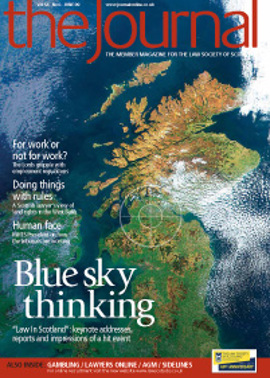Committees: the unsung heroes
The valuable work of the Society has received considerable attention in its 60th anniversary year, from law reform through professional practice to education and training, not to mention the relatively smooth transition to a new regulatory system. Yet none of the departments responsible for those projects could function effectively without considerable input from the Society’s many and diverse committees.
The number of committees changes over time, and subcommittees and working groups are set up to deal with specific issues. Law reform, which looks after four of the 17 committees directly accountable to Council (law reform, criminal law, access to justice, and legal aid), relies heavily on the committee structure. In total it has 25 subcommittees or working parties. These vary in size, involving a total of around 150 practising solicitors, all experts in their respective fields.
Michael Clancy, Director of Law Reform, stresses that, in seeking to ensure new legislation is workable, committee members carry out a valuable service on behalf of both the profession and the public. “Making sure that new laws will not be bad laws brings all-round benefit.”
Derek Arnott, convener of the Banking Law Subcommittee, points to the incentive for specialist practitioners to ensure Scotland continues to have a stable and flexible legal system. “If this means devoting a small amount of time to the work of the Society’s committees it is a price well worth paying. We can certainly cite examples where the work of my subcommittee has prevented potentially damaging or defective legislation coming into effect.”
Committee members themselves can benefit from the insight gained into the latest legal developments, and from networking with practitioners carrying out similar work, as the Criminal Law Committee’s Peter Lockhart recognises: “The committee includes some of the best criminal law practitioners in Scotland. There is a wealth of knowledge and experience and it’s a great opportunity to share in that. Also with the enormous change and development in criminal law over the last few years, it means you are at the forefront of all new legislation.”
Scott Rae, convener of the Trust and Succession Law Subcommittee, agrees. “It is of real interest in technical areas to have the opportunity of early involvement and ability to comment on proposals, as well as a very good way of keeping aware of changes.”
Giving something back is a common theme among committee members. Hilary Patrick of the Mental Health and Disability Law Subcommittee takes that view. “I have always regarded the solicitor’s job as more than providing advice to clients. If there are things wrong with the law, or if it could be better, we should say so. I have found it personally very fulfilling to play a part in the reform process.”
Morag Driscoll, Convenor of the Family Law Subcommittee, echoes that sense of personal fulfilment. She also notes the difference that the work can make, in particular when dealing with Holyrood. “We have a Scottish parliamentary system which is very responsive to consultation – and that will only work if people and professions respond to consultation.”
Peter Lockhart agrees. “I have been involved in working parties looking at a whole range of Government initiatives, proposals and legislation. I believe the Scottish Parliament does take on board the views of the Criminal Law Committee. On several occasions, members have been asked to appear at Justice Committee meetings.”
The value which the UK legislatures place on the Society’s opinion has recently been noted by one MSP in this publication (Journal, April, 8), as well as by the Lord Advocate at the Society’s annual conference (p 14 of this issue).
“The work of the committees makes a real difference,” says Michael Clancy. “We couldn’t function without committee members giving up their time to help draft consultation responses, attend evidence sessions, suggest amendments to bills and speak to the media. And they are essentially doing pro bono work. That ethos is not only an expression of professionalism; it results in practical benefits for the public and the legal system.”
In this issue
- Spanish executry law – cross border issues
- The Scottish Parliament’s Emergency Bill procedure
- One year on
- Unequal before the law (1)
- Ian Smart's inauguration speech
- Your new First XI
- Dangerous loophole
- Unlocking the rule of law
- Our guiding light
- A hit for the conference
- Of chairs, trains and escalators
- Unequal before the law
- Matters of the mind
- New game, new rules
- Advance on all fronts
- Making openness work
- The First XI
- Society parleys with the OFT
- Professional Practice Committee
- Committees: the unsung heroes
- Find a client?
- Platform for success?
- Ask Ash
- Constant foe
- Killer question
- A time to be inventive
- Deep pockets required?
- Win some, lose some
- New client - new problems
- Website review
- Book reviews
- A business view






